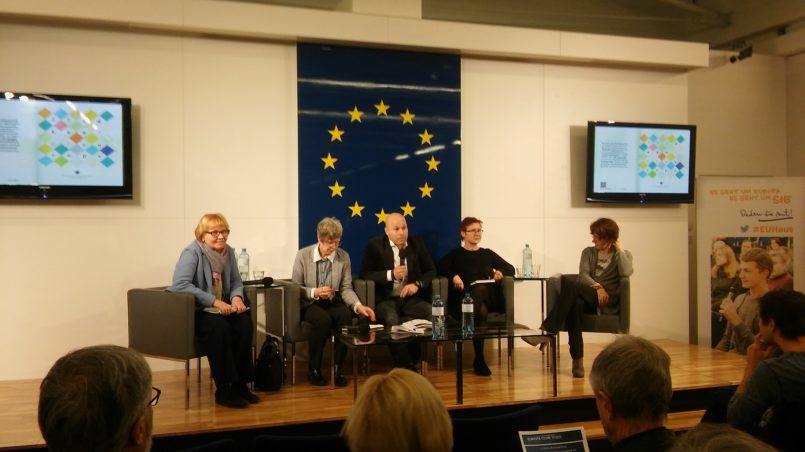Constructive Ideas in Times of Populism

Event data
- Datum
- 13. 12. 2016
- Host
- Österreichische Gesellschaft für Europapolitik
- Location
- Haus der Europäischen Union, Wipplingerstraße 35, 1010 Wien
- Event-type
- Podiumsdiskussion
- Participants
- Ulrike Guerot, Donau Universität Krems
- Elisabeth Hagen, Wiener Institut für Internationale Wirtschaftsvergleiche (WIIW)
- Margit Schratzenstaller-Altzinger, WIFO
- Melanie Sully, Go-Governance Institut
- Paul Schmitt, Generalsekretär der öst. Gesellschaft f. Europapolitik, Moderator
According to the opinion of the founder of European Democracy Lab, Ulrike Guerot, we are facing a decision as to whether or not we allow the corset of national socialism to further constrain us or to move towards the development of a European Republic. The propogated renationalisation in Europe and the USA is, according to Guerot, not taking place.
The cracks are penetrating the societies of the individual states (in the USA, for/against Trump, in France, for/against Le Pen, in Austria, for/against Hofer) and it is still difficult to assess the result of the dynamic which results therefrom.
Populists have an advantage over most of the current constructive approaches because they convey a clear message: leave the EU, leave the Euro. They do not offer a well-elaborated counter-model. One could counter these ideas with the concept of a European Republic: it is transnational, all citizens are equal before the law, as in Cicero’s „Republik“, the ius consentis is the basis of co-existence.
To give a current example: according to the Guardian, the Brits will possibly be offered a personal opt-in for a Union citizenship in the course of the Brexit negotiations. If this resolution is brought before the ECJ, this Union citizenship could be a possibility for all EU citizens.
Melanie Sully, co-founder of the platform, go-governance, considers the idea of a Union citizenship interesting but is of the opinon that it will not solve the current problems. A significant reason for Brexit was the lack of trust in the grand statements of established politicians.
It is not enough to better manage the expectations of the population. The problems lie deeper: politics no longer solve the big questions, many untruths are being spread (for example, in the Brexit campaign).
Populists like to present themselves as anti-Establishment but they are usually a part therof.
To the question of what the Europe Union will offer Great Britain and whether one should wait passively on the triggering of Article 50 of the EU Treaty, Sully is of the opinion that this waiting has to be considered as an excuse for the prevailing lack of phantasy of EU policy.
In the UK itself, the majority of the “remainers” i.e. those who voted to remain in the EU, have already come to terms with Brexit and the discussion mainly revolves around the question of how.

Photo: from left to right: Elisabeth Hagen, Melanie Sully, Paul Schmidt, Margit Schratzenstaller-Altzinger, Ulrike Guerot
Great ideas and many small steps are needed in order to realise this, according to Elisabeth Hagen from the Institut für Wirtschaftsvergleiche. The EU budget is currently the subject of negotiations and problem areas, such as economic growth (investment impulses) and unemployment (employment and training support) could be directly addressed here and globalisation could be brought back on board politically with clear messages. Consideration has also to be given to a European social system, including a European minimum income.
According to Margit Schratzenstaller-Altzinger from Wifo, the issue of the alignment of the European tax policy, which is often demanded, is very complex. Many diverse interests are at stake, e.g. in the case of the harmonisation of the minimim tax rate for corporate tax, at first glance there were both winners (those subject to the high corporate tax rate until now) as well as losers.
However, it has not been recognised and it does not want to be recognised that also those subject to the lower corporate tax rate could benefit from a harmonisation as, until now, they had to offset the financial lacunae which inevitably arose due to the “lost” corporate taxes with taxes for the employed and private entities.
High levels of assets and corporate profits are always more difficult to tax. It is no longer possible to solve the imbalance in the tax structures on the national level. The EU could bring new ideas but instead, it loses itself in its defensive position in the details of legal decisions (e.g. the parent subsidiary Directive).
Ulrike Guerot demands that we take a step back and that we have to clearly define what we in fact want from Europe. According to Tucholsky, all sovereignty in the national state comes from the people and it will not return so quickly. We are all the people, the sovereign national state acts on our behalf.
It is, therefore, not a constant (ultimately it has only existed for a relatively short period of time in the history of mankind): if the people so wish, it can demand the return of sovereignty (and the allocation to other levels). Guerot has in mind a federation of states according to the concept of integrated federalism of Hannah Arendt.
Geurot considers the anti-Establishment position of some critics to be positive in principle: protest against authority is necessary as a corrective of a society. This becomes problematic when a sub-group purports to represent the people. The anti-pluralism aspect is dangerous: how can fair representation be organised when those who, for example, define a dominant culture, distance themselves from others and exclude them?
Ethnic groups should not be pitted against ehnic groups, the door to proto-faschism would thus be opened widely. Nationality is nowadays a competition factor (see taxes) and places citizens in competition with each other. This is why Guerot advocates that personal citizens’ taxes have to be the same for all Europeans.
She does not consider this necessary in the case of corporate taxes and territorial corporate taxes because a company has to decide between either low taxes or qualified workers (who wish to live in a pleasant environment).
The step from utopia to reality can be made by clearly formulating the issues: by formulating the objective, the means to this and to demand this tenaciously. Jacques Delors‘ principle was:
The question from the audience as to how the national state can be persuaded to no longer be a national state was answered by Guerot as follows:
It has always been the aim of the European project to overcome the national state. In the last 200 years, Germany has changed its statehood seven times. The empirical conclusion of this: the national state is not the end of history. “If things are not perceived in a new way, an idea will never become reality.”
According to Schratzenstaller-Altzinger, the social component got lost in the crises which Europe has experienced in the last few years. Many current problems would have a social component. In Europe a discussion is lacking regarding which topics can be solved best at which level. The EU budget continues to follow the old model: 40% of the budget is devoted to agricultural subsidies. Here, a reassignment to the national state would make sense.
The “losers” have to be listened to at last: For 35 years they have fallen by the wayside and everyone has told them how badly they are doing. Works such as Capital in the Twenty-First Century by Thomas Piketty have not been sufficiently discussed in the media. With positive measures (e.g. citizens’ income and European unemployment insurance) one could once again convincingly explain to these people that they would get on better.
The many words have to finally lead to action. These measures would, according to Elisabeth Hagen, benefit both the “losers” as well as the groups often subject to the ranting of the populists: refugees, foreigners, the unemployed. If these economically marginalised groups worked together and united, they could exert much pressure on governments and the EU.
Translation German-English: Donna Stockenhuber
Credits
| Image | Title | Author | License |
|---|---|---|---|
 |
participants | Christian Janisch | CC BY SA 4.0 |
 |
Populismus Header | Phil Plait | CC BY SA 2.0 |
